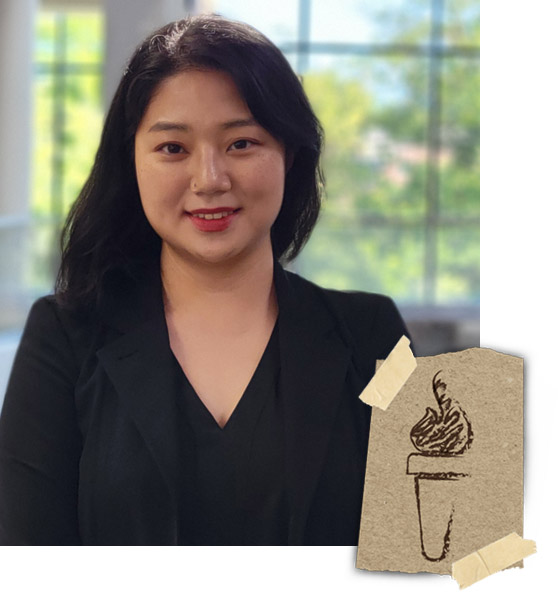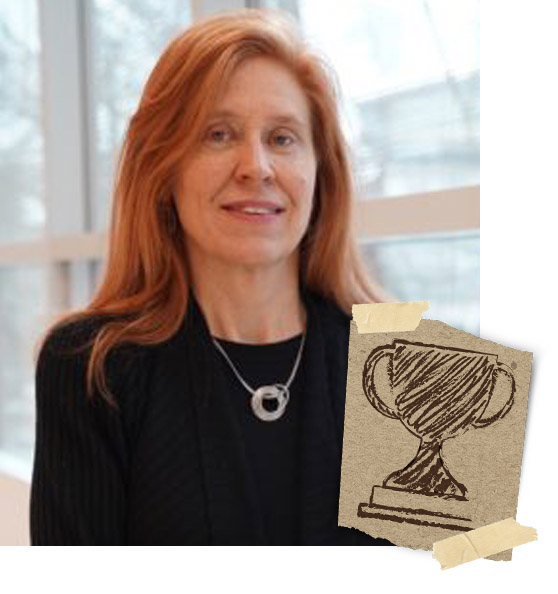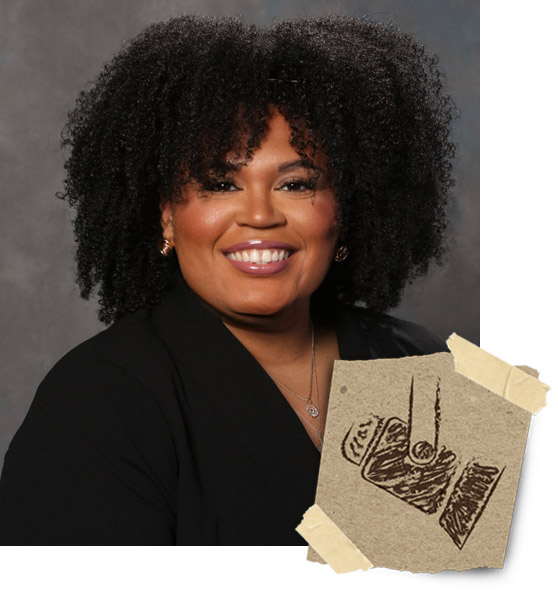Diversity Torch: Dasom Jang
August 21, 2024 - Emily Jodway
 Dasom Jang is our Diversity Torch for the month of August, as we prepare to celebrate Women’s Equality Day and the signing of the Nineteenth Amendment on August 26. Jang is a PhD student in the School of Human Resources and Labor Relations (HRLR), and focuses her research primarily on issues surrounding employee well-being and racial and gendered culture in the workplace. Some of her recent projects have focused on work-life balance, especially in the post COVID-19 work environment, parental leave, and the differences between these across companies and cultures. Her search for solutions to provide women more support in the workplace against prejudice and shouldering the burden of child and family care makes her an excellent choice for our August Diversity Torch.
Dasom Jang is our Diversity Torch for the month of August, as we prepare to celebrate Women’s Equality Day and the signing of the Nineteenth Amendment on August 26. Jang is a PhD student in the School of Human Resources and Labor Relations (HRLR), and focuses her research primarily on issues surrounding employee well-being and racial and gendered culture in the workplace. Some of her recent projects have focused on work-life balance, especially in the post COVID-19 work environment, parental leave, and the differences between these across companies and cultures. Her search for solutions to provide women more support in the workplace against prejudice and shouldering the burden of child and family care makes her an excellent choice for our August Diversity Torch.
Jang grew up in Daegu, South Korea, in a city she describes as being very traditional. Although her parents carried in their minds thoughts for how Jang’s future would unfold, Jang had different ideas, and chose to begin traveling the world independently shortly after her graduation from Ewha Woman’s University in Seoul.
“I’ve always wanted to have those international travel experiences growing up because my family used to travel a lot,” she explained. “That led me to apply for an exchange student experience in college, and then I lived in Oslo, Norway for about a year.”
By this point, Jang had garnered work experience both in Korea and Norway. “I was able to see the stark differences between the working arrangements and environments between us in Korea and Norway,” she said. She noted things like a more open floor plan and relaxed office environment while in Oslo, and found that Norwegian employees were very family oriented and took long breaks over summer and the holidays to spend time with their loved ones. Their government had policies in place encouraging the use of parental leave for both male and female workers, with an equal distribution of leave time available. In Korea, little or no maternity leave was offered, and women were left unsupported as young working mothers, expected to perfectly balance being a good employee and taking care of children and older family members.
“There’s this culture in Korea, or trend, of women being successful in doing both,” Jang explained. “And blaming those who cannot be this exemplary case. They tend to individualize the sources of the problem, and there’s very little government support at all.”
Despite employees in Norway being absent from work for a longer portion of the year than those in Korea, “It occurred to me that my Norwegian colleagues were just as competent, if not more, than Korean [people], and I got curious about what resulted in this huge difference,” Jang said.
Shortly after, Jang returned to school to earn her graduate degree before making the decision to come to the United States to pursue a PhD. She liked the fact that many programs in the United States offered interdisciplinary programs, and particularly saw MSU and the HRLR program as a way to incorporate concepts in psychology, sociology and labor relations in her examination of these workplace structural differences.
Jang began her dissertation focusing on algorithmic management and the relationship between technology and organizational control, and was particularly interested in the ‘datafication’ of employees. She examined trends surrounding the use of productivity scores and workplace surveillance as well as quota requirements for employees in places like Amazon warehouses. This in addition to researching productivity and wellbeing for employees when in the presence of others, in both virtual and physical spaces, got her even more interested in the relationship between the individual and technology, as well as the individual and their employer. She also began to incorporate research on workplace instances of microaggressions and intraracial discrimination.
One related study Jang has been working on is an examination of epistemic exclusion with Dr. NiCole Buchanan in the Department of Psychology. Jang saw firsthand while in Korea the effects of this exclusion. Faculty members doing interdisciplinary work were often ‘othered’ and seen to be not devoted enough to one discipline or the other, for example, a sociologist studying programming language through computer science was not considered to be a ‘sociology enough’ area of research. This falls under the umbrella of workplace issues that Jang is looking to find solutions for, and all can relate back to technology and management.
“The tensions between institutions and individuals have been ignored a lot of times,” she said. “People and technology, they’re not mutually exclusive. I’m looking at these workplace issues, the control aspect of it, and how technology, although we may say it’s going to increase our autonomy, that might not always be the case, and it’s not about the technology, it’s more about the management.”
As for issues surrounding gender equity in the workplace and parental leave, Jang says that the US can fall anywhere along the spectrum of policies that she saw in two different extremes in Korea and Norway. These policies vary greatly depending on the company, its culture, its management and their current initiatives, as well as how much surplus capital they have available, if any, to promote their workplace’s culture.
“One thing I can say for sure is that equity is not a top priority,” she said. “All these policies, although some of them can resonate with current human rights issues, are always kind of secondary. Some of them are very ideal. Some of them are more like Korea.”
Jang is still on her journey toward finding solutions to the many workplace complications that have emerged in a new era of technology and virtual spaces. While it’s inevitably up to the organization to implement changes that may improve work-life balance, Jang has some suggestions for ways that we can move toward equity in the workplace and support one another, especially women faced with the challenges of balancing childcare and employment.
“Understanding these ideas of the individual versus the institutions, and recognizing the institutional or structural context, can help women navigate those scenarios while minimizing self-blame and acknowledging that it’s not all on you, it takes a village to raise a child,” she explained.
While some women are able to resume work quickly following the birth of a child, Jang hopes that others will recognize that everyone’s experience is different and one type of woman isn’t more accomplished than the other based on how quickly they were able to return to the office. Rather than put some women on pedestals, or compare experiences, Jang suggests having open conversations, sharing stories and not internalizing the mix of feelings that can come from navigating these societal expectations.
“Everyone has different resources available to them for supporting their child or pursuing their careers. What you can do as an individual, as a woman, is to differentiate yourself from the structural influence and identify that it’s systematically wrong. And sharing stories can help prevent falling into that trap of self-blame and can be used to increase awareness and talk about strategies to navigate some of those work-home tensions.”
Read more:

Diversity Champion
Faculty/Staff
Dr. Elizabeth Drexler
Dr. Elizabeth Drexler is our Diversity Champion. A Professor of Anthropology and Director of the Peace and Justice Studies program, Drexler has spent over 20 years both examining and educating her students on issues surrounding human rights, structural injustice, and how to be an active citizen and engage in social justice movements.

Diversity Spotlight
Alumni
Diamond Day-Parker
Diamond Day-Parker is our Diversity spotlight honoree for August. A 2019 graduate of the Interdisciplinary Studies program, Day-Parker concentrated her studies around health and society. She is currently a Public Health Consultant for the Michigan Department of Health and Human Services, and is passionate about health education, community outreach, and support for Black women and new and expectant mothers.

Diversity Matters
We strive to cultivate an inclusive and welcoming college environment that celebrates a diversity of people, ideas, and perspectives.

